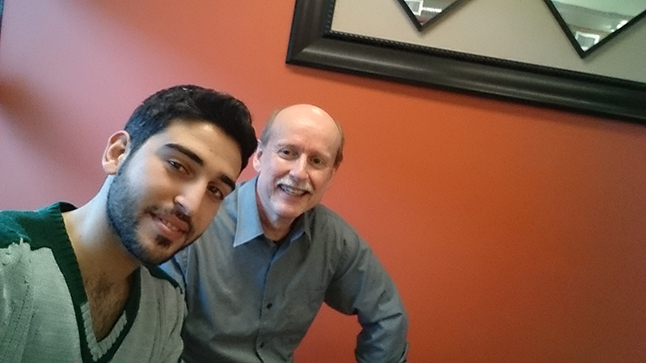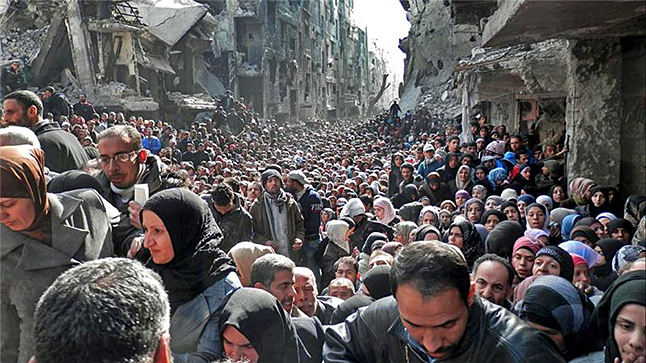
By Rana Nelson and Robyn Abear
SALMON ARMS — Peter Twele, a Surrey-based researcher, author and speaker on the Middle East, was in Salmon Arm last weekend to talk to groups bringing refugee families to the area. Through his books and workshops, Twele’s aim is “to help people learn about and appreciate the Middle East. It’s a complex region which is currently trying to cope with many unfortunate conflicts and tragedies.”
Last Friday and Saturday, Twele gave some helpful information for Syrian-Canadian interaction. We summarize that information here, with some added material from Mustafa Zakreet, the first of Salmon Arm’s refugees to arrive in that community. Zakreet was present at Twele’s workshops, and the two chatted back and forth in Arabic throughout the sessions, sharing and confirming information.
Religion: The dominant religion in Syria is Islam, with 74% of the population (before the war) Sunni Muslim and 16% Shiite Muslim. There are also Christians in Syria, and a small population of Jews. Like all religions, the main values of Islam teach tolerance and love to others. Like other religions, including Christianity, it is the militant offshoots that promote violence.
Dress: Many Syrian women wear a hijab, essentially a scarf covering their hair, when in public or when around men. Some Muslim women will cover their head and upper body (khimar), wear a long coat (jilbab), or wear a full robe covering their face (burqa). Zakreet notes that Sryian women rarely cover their faces. Syrians will, however, likely find some Canadian dress customs embarrassing, such as summer clothes, including swimsuits. These days, there are many clothing options for Muslim women living in Western countries, including the Burqini,™ a two-piece swimsuit that meets the Islamic requirements for modesty.
Society: Syrian and Middle Eastern society is about connections. Certainly connections matter in Western society as well (think of the rise of social media), but simplistically, one could say that Western society is competence-based and Middle Eastern society is connections-based – partly because of nepotism and corruption in government circles. Things get done by who you know, and problems are solved in a roundabout way, as it may be dangerous to request or seek something directly. People stay within their circles for the support systems that have been built up.
Family: One of the most important things in Syrian family culture is to strive to bring honour to your family and to avoid bringing shame upon your family. Therefore, there is personal suppression of desires so that the family’s honour is upheld. For example, women must be accompanied by an older male member of the family when out in public in most places. However, because families are so intertwined and connections are so important, our more-independent Western society may feel lonely to new Canadians.
Relationships: Affection between men and women is not shown in public. Men may kiss each other on the cheeks in greeting, or hold hands in public as an indication of friendship. Women may greet each other similarly, but men do not greet women in public (no handshaking, hugging, cheek kissing) unless the woman initiates it, and then only by a handshake. What a man the West may consider a guiding hand on a woman’s elbow to help her into a car, for example, would never be done in Muslim countries by a man who was not the woman’s husband. Husbands may be (much) older than their wives.
Children: Children are valued and loved in Syria and the Middle East, although slapping may be used as a form of discipline. There are laws against domestic violence in Syria, although as in Canada, it still occurs.
Food: Muslims do not eat pork. And for many Muslims, other meat, such as lamb, beef, and chicken, must be ‘halal’, which means butchered by a Muslim using the correct procedure. Muslims also eat fish. If halal meat is important for the family who arrives in Revelstoke, they will need to purchase it out of town unless we can procure it here.
Ramadan: This Islamic holy month is a period of prayer and fasting, where Muslims do not eat or drink from sunrise to sunset. According to Zakreet, it is a time of self-reflection and an acknowledgement of those who do not have enough to eat on regular days of the year. Each night the fast is broken with a meal called the iftar, which is often celebrated with friends and family. This year, Ramadan is in June, which will make for long days without food.
Many Islamic customs are unfamiliar to Canadians. Our misinformation ‒ and yes, our fear ‒ can contribute to emotional reactions and cultural prejudices. However, as one audience member in Salmon Arm noted, the number of refugees coming to Canada reminds us of “the importance of dialogue on issues” like religion, dress, and customs. In his Power Point presentation, Twele stated that “we have the opportunity to help tear down the stereotyping” that exists around issues and practices that we do not know much about.
In offering a home to families in a desperate situation, we must be willing to expand our minds past what we think we know to allow new knowledge to come in. Refugees and sponsoring communities have much to learn from each other; through dialogue and understanding we can help make this new experience a positive one for all of us.

In related news, the Revelstoke for Refugees Committee has raised so far $29,454 to help bring a refugee family here this spring. Once it reaches $30,000 it can begin the process of bringing a family here.
The Application Committee (George Brodie, Janet Lemieux and Stephanie Melnyk) is beginning its work so things may move more quickly than originally thought, Revelstoke for Refugees Chairwoman Rana Nelson said in an e-mail
She also said the Fundraising Committee will begin approaching businesses in the next few weeks for donations.
“At this point, there doesn’t appear to be a need for a big group meeting as we are now at the point where we are breaking off into the smaller committees,” Rana said. “Therefore, the next meeting of Thursday, February 4 at 7 pm at the Community Centre will be for those interested in being on the Bridge Building Committee, which Robyn Abear has agreed to lead, so she will be chairing the meeting. I know that this time doesn’t suit some of you who are interested in the BB Committee, so please email Robyn (brobyn@telus.net) if you’d like to help but can’t be there.
“The BB Committee is responsible for the day-to-day aspect of working with the refugee family. Robyn received some helpful info from the Salmon Arm group about the various subcommittees of that group, which include: Accounting, Clothing, Forms and Applications, Education, Health, Language, Employment, Shopping, and Counselling.”
She said there is likely going to be a role for everyone who wants to get involved in this community project.



